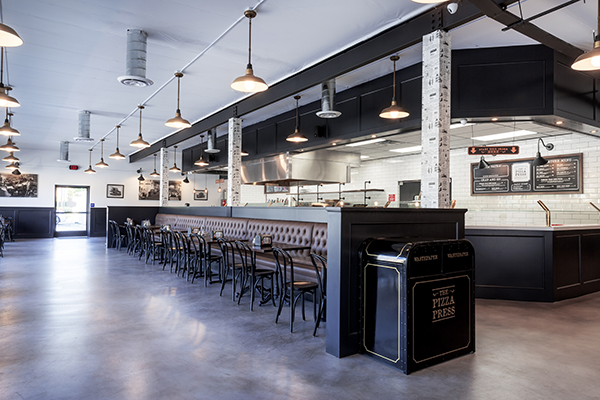The owners of a new vegan pizza concept Wild Pie thought their idea had promise but had some lingering doubts about how the north Florida market would take to it. They had some fundamental questions: Could Wild Pie have appeal beyond vegans? What locations would support the concept? Could they build brand loyalty while competing with other pizza brands?
Reluctant to invest in a brick-and-mortar space until they had a better handle on these issues, Wild Pie, on the advice of their consulting firm The Culinary Edge, turned to a food truck to field test their idea. “Wild Pie was a new kind of concept. It is vegan food, but not really targeted exclusively to vegans,” says Graham Humphreys, CEO, The Culinary Edge.
The food truck allowed Wild Pie to test their hypothesis at a reasonable cost. “It allowed them to find out who their guests are, and how to market the concept,” says Eric Fernandes, lead R&D chef, The Culinary Edge. “It also allowed them to build brand awareness before opening their first brick and mortar.”
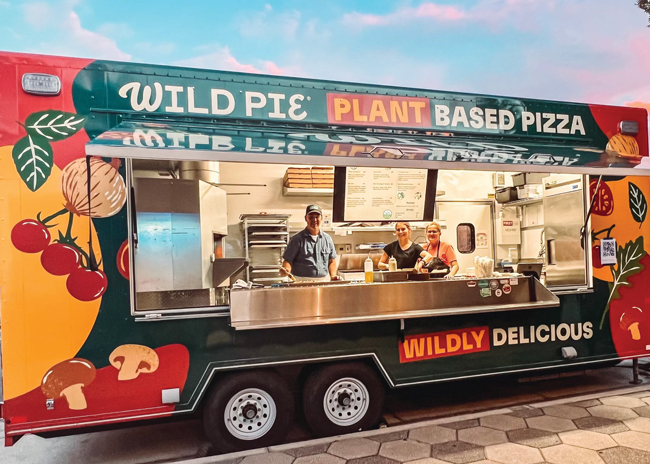 Wild Pie’s lone food truck is used to build brand awareness prior to opening new brick-and-mortar sites. Images courtesy of The Culinary Edge.
Wild Pie’s lone food truck is used to build brand awareness prior to opening new brick-and-mortar sites. Images courtesy of The Culinary Edge.
Food trucks offer several advantages for brands looking to establish new concepts and for existing brands aiming to expand:
Smaller investment. A food truck costs much less to acquire and outfit than a permanent location. Unlike paying ongoing rent at a brick-and-mortar site, once the truck is paid for, the owner only faces fuel and maintenance costs to keep the business open. This is particularly advantageous where the cost of real estate is exorbitant.
Mobility. Unlike a building that is permanently stuck in the same location, a truck can be moved daily to meet large groups of customers at locations hosting concerts, sporting events, weddings and festivals.
Brand awareness. With the ability to relocate daily, trucks can expose the brand to more customers within a given territory. They can reach a broad range of the population by appearing at many types of events and locations.
Customer loyalty. By traveling to areas with the most receptive clientele, over time, even a niche concept can build an enthusiastic customer base.
Test new ideas. Food trucks make cost-effective testbeds for new concepts and allow brands to try out new menu items and service approaches before committing to them at a physical location.
Raise more revenue. Trucks are alternative venues to boost revenue for brands both within areas where they have permanent locations and in new territories. Some areas may not be populous enough to support a brick-and-mortar site but can support a food truck franchise.
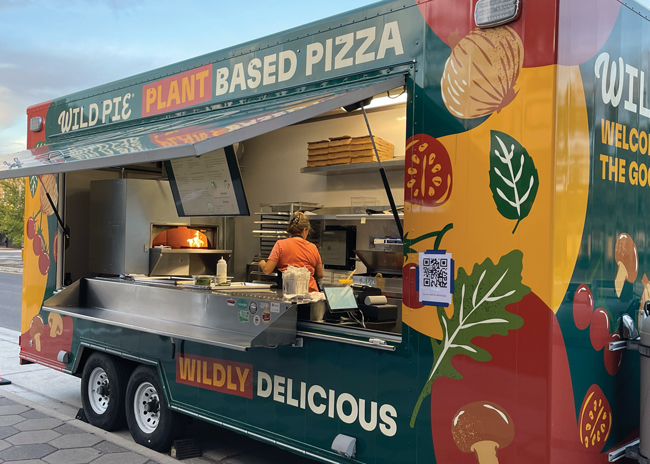 Wild Pie’s propane-fueled stone pizza oven is visible to customers from a distance. This is a deliberate strategy to emphasize a quality product, the brand says.
Wild Pie’s propane-fueled stone pizza oven is visible to customers from a distance. This is a deliberate strategy to emphasize a quality product, the brand says.
Test Subject
Wild Pie opened for business with a single truck and has since focused on brick-and-mortar sites. The brand has opened two locations to date in northern Florida — one in Jacksonville and the other in Gainesville. The truck helped drum up business for each site so that when the doors opened, a customer base had already been primed. The brand will continue that strategy prior to opening new sites in other cities.
“We created a very arresting visual ID with images of produce — the elements that go into the product,” Humphreys says. “The truck was like an advertisement on wheels.”
It was a more effective brand builder than a static site could be. “People don’t always see your first brick and mortar,” says Fernandes. Tucked within a strip mall, a typical fast-casual brand has limited visibility. It may have a sign above the front picture window façade and another sign near the parking lot entry stacked among signs for other businesses. Neither of these attracts much attention compared to the vibrant billboard of the Wild Pie food truck that appears before large gatherings of people.
Wild Pie took the truck to many events and zeroed in on ones that were focused on health and wellness. These were likely to attract their share of vegans, the prime demographic. The truck is outfitted with a large domed stone pizza oven positioned so that customers can easily see it. The point was to emphasize the quality of the product by making the stone oven — an unusual feature for a food truck — visible from a distance.
The truck helped create a core group of enthusiasts — some drove an hour to buy a pizza. The truck also attracted some customers who the owners hadn’t considered as the brand’s top prospects. For example, it had success with middle-aged men who might have avoided a brick-and-mortar site. “They were not likely to walk into a place with a lot of vegan hipsters,” Humphreys says.
The brand is likely to keep just the one truck on the road for now. “They didn’t want to invest in one large commissary that you would need for multiple food trucks,” Fernandes says. Many communities have commissaries that rent space to food truck businesses, making start-ups like Wild Pie more economical.
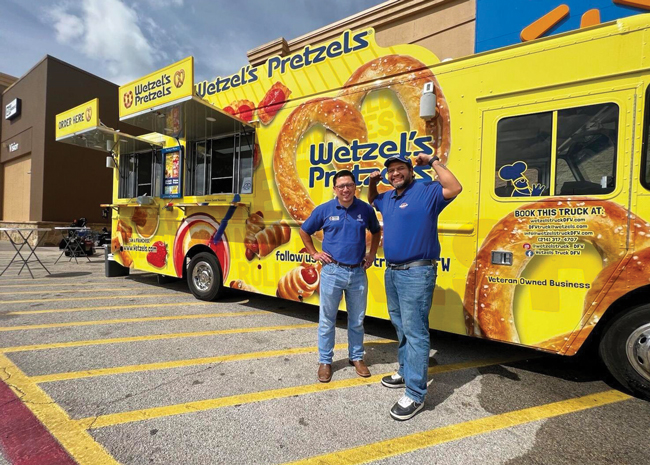 Wetzel’s Pretzels’ vibrantly colored franchised food trucks are like mobile billboards for the brand. Image courtesy of Wetzel's Pretzels
Wetzel’s Pretzels’ vibrantly colored franchised food trucks are like mobile billboards for the brand. Image courtesy of Wetzel's Pretzels
Established Business Booster
Wetzel’s Pretzels was launched in 1994 and today has more than 385 brick-and-mortar locations. The brand also franchises food trucks with 28 of them on the road and more in the pipeline. Wetzel’s first food truck was deployed in 2020 as part of an alternative growth strategy and effort to increase brand awareness.
“It’s another revenue stream,” says Diana Krankl, senior franchise sales manager, Wetzel’s Pretzels. But the brand has also found from customer feedback that food trucks drive foot traffic to brick-and-mortar sites. Customers try out the company’s products at events like the Los Angeles County Fair and then seek out permanent locations for repeat business.
The brand is using trucks to expand to areas where a permanent location might not be viable but has enough potential customers to make a food truck franchise work. For example, a franchise recently opened in sparsely populated northern Idaho.
Operating a food truck comes with some distinct challenges as compared to permanent outlets and there is a learning curve. “We’ve learned a lot since 2020,” Krankl says. “Every year, we’re getting better.”
Limiting your menu, in most cases, is a must, she says. Space-constrained food trucks don’t have the capacity to prepare as many offerings as a brick-and-mortar site. This is especially true at large events such as professional golf tournaments or NASCAR races that attract thousands — even tens of thousands of people. “Limiting your menu works better operationally and helps to maximize profits,” Krankl says.
Wetzel’s corporate managers leave it up to the franchisees to decide which items to shave from the menu. “They might just offer bites — salted pretzel bites and pizza bites or cinnabits,” Krankl says. “It depends on the event and what the customer might be looking for.”
Also critical is an up-to-date, robust point-of-sale system. Wetzel’s system includes handheld devices enabling staff to take credit card orders from customers waiting in line, speeding up order fulfillment and freeing up space inside the truck that would otherwise be dedicated to POS equipment.
Food truck operators must navigate a varying landscape of rules and regulations. “Every city has different regulations,” Krankl says. “We have to make owners understand that. Not every city is food-truck-friendly.”
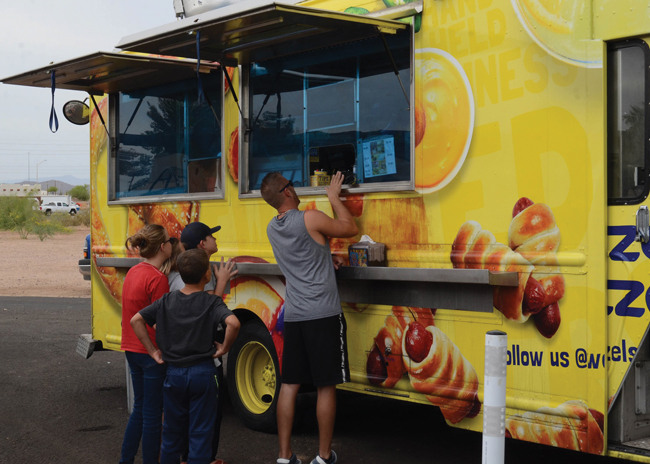 Food trucks like this one make much of their revenue from special events such as festivals, concerts, sporting events, and weddings. Image courtesy of Wetzel’s Pretzels.
Food trucks like this one make much of their revenue from special events such as festivals, concerts, sporting events, and weddings. Image courtesy of Wetzel’s Pretzels.
Primary Source of Business
Cousins Maine Lobster, a purveyor of lobster rolls and chowder, began as a food truck business in 2012. Trucks continue to be the company’s chief method of operation. Ten years ago, Cousins began franchising truck outlets. In 2018, it opened its first brick-and-mortar site and now has seven such locations. To date, the company has 68 trucks operating in 25 states.
The company’s founders, Sabin Lomac and Jim Tselikis, had no experience running a food business when they started. Food trucks offered them an affordable entry into the business. They emphasize the importance of partnering with the right franchisees in the right cities. “We look for people who are kind, ethical, and hard-working,” Tselikis says. “They don’t need a huge portfolio of business experience, but they should be willing to listen and learn.”
To maximize revenue, it is important for trucks to move frequently to new places, Tselikis says. “We don’t want to go to the same locations too often,” he says. It’s equally vital to be consistent with quality and service standards. To that end, the brand has an extensive training program that includes having franchisees work on a lobster boat for a day. The aim is to ensure that staff understands the backstory of what makes Maine lobster special and why the brand’s meals that cost $30 to $40 each are worth a splurge.
Cousins does its best to make the customer experience more comfortable with an order app that informs customers when their orders are ready. This allows guests to wait in their cars in unfavorable weather and makes it easier for trucks to operate year-round, even with snow falling in cold climates or when extreme heat bakes sunbelt locations.
Like other brands, Cousins assigns franchises by county or zip code. Some franchisees have ample business to operate multiple trucks within their territories. The key avenue for generating business is social media, Tselikis says. Franchisees can easily inform patrons about events they will attend. “We also reach out to wedding planners and event planners,” Lomac adds. “We do a lot of birthdays, bar mitzvahs, movie studio work and golf tournaments,” he says.
Tsekilis warns aspiring truck operators to guard against complacency, which can be a trap after achieving some success. “We continue to refine the layout of trucks and look at how to make throughput better,” he says. Cousins shows no signs of falling into complacency. The brand recently announced a series of leadership changes in support of continued expansion plans.



